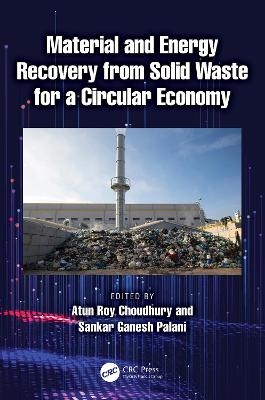
Material and Energy Recovery from Solid Waste for a Circular Economy
CRC Press (Verlag)
978-1-032-39976-8 (ISBN)
Material and Energy Recovery from Solid Waste for a Circular Economy describes solid waste to material and energy recovery to bridge the gap between theoretical possibilities and on-field criticalities. It deals with various resource recovery possibilities from numerous waste streams such as municipal solid, hazardous waste, human faecal sludge, construction and demolition waste, and electronic waste. The practical issues of resource recovery and possible remedies derived through onsite practice and experience are incorporated. It includes real-life feasibility analysis and implementation of waste-to-energy systems supported by case studies.
Features:
Provides comprehensive discussion on both energy and material recovery
Addresses the missing linkage between the techno-commercial feasibility of existing systems and environmental impact
Discusses techno-commercial feasibility and environmental impacts
Offers balance between theoretical knowledge sharing and practical execution-related issues
Includes case study, LCA, and technical feasibility chapters
This book is aimed at graduate students and researchers in environmental, civil, and chemical engineering.
Atun Roy Choudhury is an accomplished professional currently serving as Assistant General Manager at Cube Bio Energy Private Limited. With a distinguished career spanning esteemed organizations, he is widely recognized as a leading researcher specializing in waste management and water sanitation. With numerous publications and extensive experience guiding dissertations, Atun enjoys a stellar reputation within the research community. He is a sought-after author, speaker, editor, and reviewer for international scientific platforms. His exceptional contributions have earned him prestigious titles and awards, including a gold medal from the University Grant Commission. Atun's expertise extends to environmental auditing and quality management. His groundbreaking work on microbial waste digestion has garnered global acclaim, being listed in reputable records and endorsed by the United Nations. Prof. Sankar Ganesh Palani is Professor of Environmental Biotechnology at BITS Pilani, Hyderabad Campus. Prof. Ganesh received his PhD in Environmental Science and Engineering from Pondicherry (Central) University, India and had his post-doctoral training at the National Institute of Applied Sciences, Toulouse, France. Prof. Ganesh teaches ecology, environmental science, environmental biotechnology, waste management, sanitation technology, and gene toxicology. His research focuses on waste and wastewater treatment, biomethanation, and biohydrogen production. He has been involved in several projects and has published 2 books, 18 book chapters, and 126 research papers in reputed international and national journals and conference proceedings.
Chapter 1: The ‘Greening’ of an Australian University: Onsite Composting of Residential Food Waste
Chapter 2: Evaluating the Bacterial Concrete as a Solution to Construction Debris Waste
Chapter 3: Sustainable Utilization of Construction and Demolition Waste in Geotechnical Engineering: A State-of-the-Art Review
Chapter 4: On the Challenge of Recycling Massively Used Polymer-Based Packaging
Chapter 5: A Comprehensive Techno-Commercial Analysis of Biomedical and COVID-19 Waste-Related Situation in India: Abetted with a Case Study
Chapter 6: Selective Collection for Optimized Recycling of Waste: Case Study: The City of Constantine (Algeria)
Chapter 7: Appraising the Natural Bio-Processes over Thermal Treatments to Treat Municipal Solid Waste: A Step Toward a More Sustainable Environment
Chapter 8: Advancements in the Recovery and Refinement ff Landfill Gas from Sanitary Landfills
Chapter 9: Bioprocessing of Organic Municipal Solid Waste for Biomethane and Biohydrogen Production
Chapter 10: Sustainable Biomethanation Process for Energy Recovery from Faecal Sludge: A Promising Solution for India's Sanitation Challenges
Chapter 11: Regulating Total Soluble Products During Food Waste Biomethanation for Material and Energy Recovery
Chapter 12: Comparative Life Cycle Assessment and Carbon Footprint Analysis of Waste Treatment Facilities
Chapter 13: Evaluation of Social Acceptance and Market for Human Excreta-Derived Products
Chapter 14: Promotion of Circular Economy Through Waste Management Policies
Chapter 15: Integrated Waste Recycling Parks: Bringing Circularity into Waste Management
| Erscheinungsdatum | 13.06.2024 |
|---|---|
| Zusatzinfo | 57 Tables, black and white; 70 Line drawings, black and white; 26 Halftones, black and white; 96 Illustrations, black and white |
| Verlagsort | London |
| Sprache | englisch |
| Maße | 156 x 234 mm |
| Gewicht | 453 g |
| Themenwelt | Naturwissenschaften ► Chemie ► Technische Chemie |
| Technik ► Umwelttechnik / Biotechnologie | |
| ISBN-10 | 1-032-39976-7 / 1032399767 |
| ISBN-13 | 978-1-032-39976-8 / 9781032399768 |
| Zustand | Neuware |
| Informationen gemäß Produktsicherheitsverordnung (GPSR) | |
| Haben Sie eine Frage zum Produkt? |
aus dem Bereich


